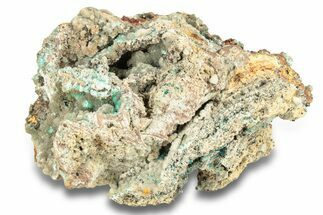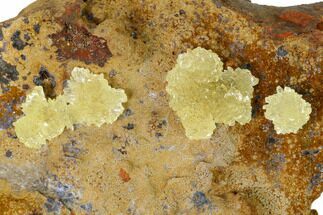This Specimen has been sold.
1.9" Yellow-Green Botryoidal Pyromorphite - Ojuela Mine, Mexico
This is a beautiful sparkling, yellow-green, botryoidal pyromorphite specimen, collected from the Ojuela Mine in Durango, Mexico. The entire specimen measures 1.9" wide.
About Pyromorphite
Pyromorphite is a vibrant, often green-colored lead-based mineral known for its striking crystal formations. Belonging to the apatite group, it typically forms in hexagonal or prismatic crystals with a resinous to waxy luster. Colors can vary from green to yellow, orange, and brown, influenced by its chemical composition. Pyromorphite is commonly found in the oxidation zones of lead ore deposits, where it crystallizes into stunning clusters or "botryoidal" (grape-like) structures. Collectors prize pyromorphite for its vivid hues, distinctive crystal shapes, and rarity, as it's typically found only in a few locations worldwide.
Safety: The lead in pyromorphite can be harmful if absorbed into the bloodstream by inhalation or ingestion. The crystals won't pose a health hazard just sitting on a shelf, but we recommend washing your hands after handling.
Pyromorphite is a vibrant, often green-colored lead-based mineral known for its striking crystal formations. Belonging to the apatite group, it typically forms in hexagonal or prismatic crystals with a resinous to waxy luster. Colors can vary from green to yellow, orange, and brown, influenced by its chemical composition. Pyromorphite is commonly found in the oxidation zones of lead ore deposits, where it crystallizes into stunning clusters or "botryoidal" (grape-like) structures. Collectors prize pyromorphite for its vivid hues, distinctive crystal shapes, and rarity, as it's typically found only in a few locations worldwide.
Safety: The lead in pyromorphite can be harmful if absorbed into the bloodstream by inhalation or ingestion. The crystals won't pose a health hazard just sitting on a shelf, but we recommend washing your hands after handling.
About The Ojuela Mine
Ojuela is not one mine but a complex of multiple mines in the same general area, located just northwest of Mapimi, Mexico. It was established in 1598 after the discovery of an old abandoned silver and gold mine. As mineral production increased and the mineral potential was confirmed, the town (Ojuela settlement) adjacent to the mine, along with the city of Mapimi, began to grow as well. The mining settlement was such a success that it contained a post office, warehouses, stores, saloons, a church, and housing for the miners. Once minerals were collected, they were processed in Mapimi, which also played a role in the rapid development of the city. Around the start of the 20th century, most of the mineral deposits were exhausted, resulting in the abandonment of the mines and settlement.
The mine is well known by mineral collectors for its aresenate minerals and a variety of other mineral species: approximately 117 have been identified from the area. Some of the most popular minerals include adamite, austinite, hemimorphite, scorodite, platternite, aurichalcite, rosasite, calcite, wulfenite, mimetite, iridescent goethite, and fluorite.
Ojuela is not one mine but a complex of multiple mines in the same general area, located just northwest of Mapimi, Mexico. It was established in 1598 after the discovery of an old abandoned silver and gold mine. As mineral production increased and the mineral potential was confirmed, the town (Ojuela settlement) adjacent to the mine, along with the city of Mapimi, began to grow as well. The mining settlement was such a success that it contained a post office, warehouses, stores, saloons, a church, and housing for the miners. Once minerals were collected, they were processed in Mapimi, which also played a role in the rapid development of the city. Around the start of the 20th century, most of the mineral deposits were exhausted, resulting in the abandonment of the mines and settlement.
The mine is well known by mineral collectors for its aresenate minerals and a variety of other mineral species: approximately 117 have been identified from the area. Some of the most popular minerals include adamite, austinite, hemimorphite, scorodite, platternite, aurichalcite, rosasite, calcite, wulfenite, mimetite, iridescent goethite, and fluorite.
SPECIES
Pyromorphite
LOCATION
Ojuela Mine, Mapimi, Durango, Mexico
SIZE
Entire specimen 1.9 x 1.7"
CATEGORY
ITEM
#236822
 Reviews
Reviews












